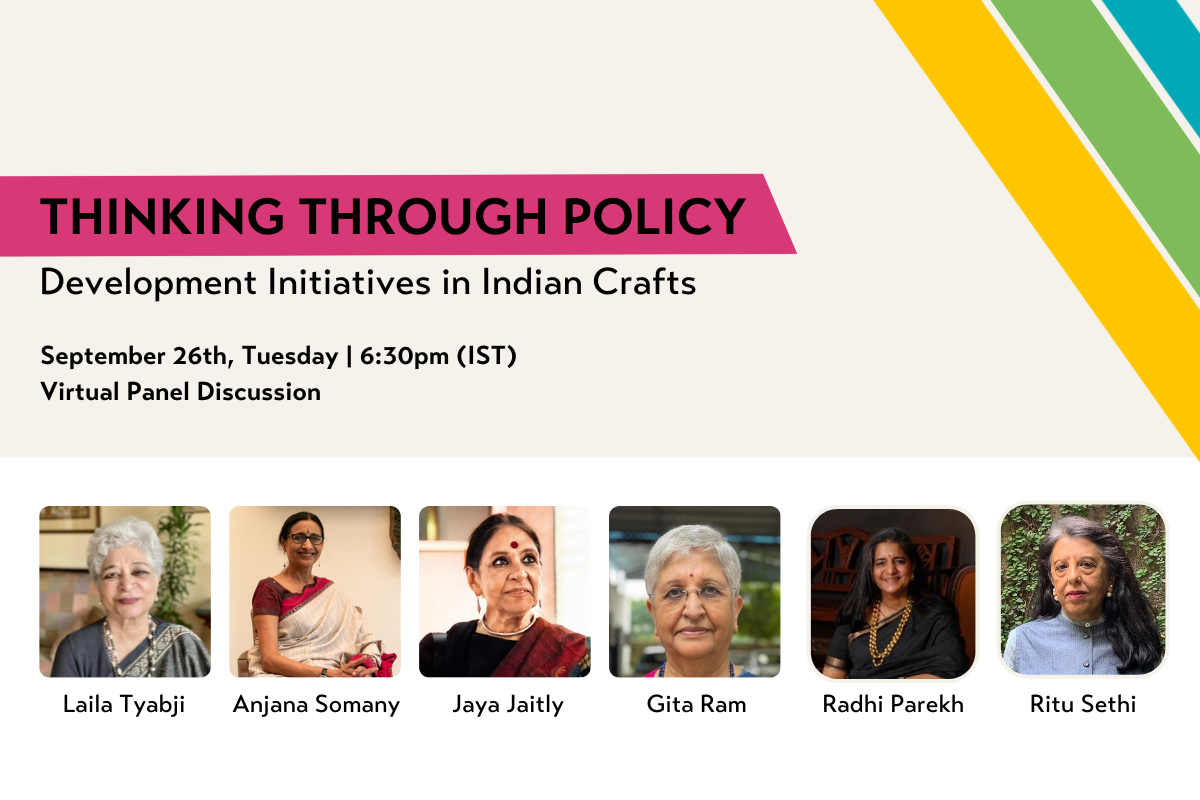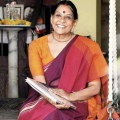Thinking Through Policy: Development Initiatives in Indian Crafts
VIEW EVENT DETAILSTuesday, 26 September, 6:30 p.m. - 8:00 p.m

The history of handicrafts from India is both rich and complicated. Post-Independence, the crafts were an important part of India’s developmental policies. A focus on economic self-reliance propelled crafts to be recognised as a key industry with craft-development policies centered on creating livelihoods and building institutions to support the social and cultural equity of craft and its makers. But given the number of stakeholders involved in their making and distribution, and the economic shifts that India has gone through, policy-making for the crafts has struggled with cohesion and adaptability over the years.
Till the 1980s, craft policy had privileged the handmade over the machine-made through several financial and regulatory schemes, which were a crucial anchor for the millions of people involved in the crafts, particularly in rural India. This began changing in the early 1990s. Economic reforms led to an expansion in the production of fast-moving consumer goods and opened up Indian markets to a global economy. As scholar Ritu Sethi argues, craft policy at this time began reflecting India’s economic focus on entrepreneurship, industrialisation and the urban, giving greater weight to the role of private players and NGOs in developing the sector. By the turn of the century, the economic landscape was such that the crafts were further deprioritised in national policy frameworks. While the cultural value of the crafts was still acknowledged, its potential to serve as a big contributor to India’s economic growth was debated. Since then, craft policy has largely remained the same.
Today, reports point to several challenges that the crafts sector continues to face: a lack of ready finance, access to markets, timely availability of raw materials, as well as upskilling barriers and missing institutional infrastructures for support across design, heritage and art. How can policy makers and policymaking for the crafts address this? In this next session of our crafts series In Practice: New Vocabularies in Craft, we take a closer look at the historical and current contexts of craft policy in India, with a focus on handicrafts. The panel brings together key stakeholders who engage with craft, craft-makers and craft policy through their academic, curatorial, or social initiatives. The aim is to collectively think through the merits, limitations and impact of public and private policies around craft-making and craft-based initiatives over the years. What do we mean when we talk about contemporary “craft policy” in India, and in what ways can the state support or re-prioritise the crafts in its policies and budget? How does public policy affect the economic, social and cultural growth of the sector? What investment avenues exist for a sector that is seen as “unorganised”? How does one contend with scale and innovation in handmade craftwork when competing with manufactured goods? Are there policy-based contingencies for emergencies like Covid-19? Like the support systems currently in place for agriculture, can similar systems be built for the crafts?
Thinking Through Policy: Development Initiatives in Indian Crafts will begin with a keynote by Dr. Ritu Sethi, founder and trustee of the Crafts Revival Trust and a member of Asia Society India's advisory council for arts and culture. This will be followed by a discussion with Laila Tyabji, founder of Dastkar; Jaya Jaitly, craft revivalist, activist, politician, writer and founder of the Dastkari Haat Samiti; Gita Ram, the Chairperson of the Crafts Council of India and Anjana Somany, contemporary curator of crafts, moderated by Radhi Parekh, founder - director of ARTISANS' in Mumbai.
***
This panel discussion is the fourth programme of In Practice: New Vocabularies for Craft, a long-term series that brings together art-makers, entrepreneurs, collectors, designers, and other stakeholders from the crafts and vernacular arts sector, in India and South Asia. The aim of the series is to act as a platform where we can collectively question and build awareness about the myriad contexts of craft and vernacular artistic traditions within a contemporary context.
SPEAKERS

Jaya Jaitly has worked closely, with India’s crafts persons to sustain traditional craft livelihoods and preserve India’s cultural heritage, since 1967 and has travelled widely both in India and abroad for her work. After guiding Design and Marketing at Gurjari, for the Gujarat Government for 11 years, she founded the Dastkari Haat Samiti, a national association of craftspeople in 1986. She created Dilli Haat, a permanent and now iconic crafts marketplace in Delhi in 1994.
She works to link crafts persons to a variety of markets through innovative strategies like creating artistic crafts maps and organising over 15 international workshops with foreign artisans and Indian counterparts to further diplomacy and India’s soft power. Jaitly linked crafts and calligraphy through an exhibition called Akshara, combining crafts, textiles, arts and calligraphy designed and created by craftspeople of her organisation.
She headed a major project with Google Arts & Culture titled Crafted in India (G.co/craftedinindia) to present the largest online exposition of craft stories online in the world. This was launched in October 2019 with Google and the Ministry of Tourism. Recently Jaitly conceived of and guided the creation of 8 art, craft and textile installations for the Shilp Deergha of the New Parliament building with a large team of craftspeople.
Her published works, apart from hundreds of articles, and essays, include the Crafts of Gujarat, Crafts of Jammu, Kashmir & Ladakh, Crafting Nature, Craft Traditions of India, Crafts Atlas of India, The Artistry of Handwork, The Woven Textiles of Varanasi, A Podium on the Pavement, and Viswakarma’s Children. Crafting Indian Scripts was published in 2015 along with the Akshara exhibition. Her most recent work is "Life among the Scorpions – a memoir of a woman in Indian politics”. She has also written children’s stories published by Penguin, Pratham, and recently Niyogi Books, and gives lectures at educational and cultural institutions.
She has served on many advisory and policy-making bodies and brings to all her public work the experiences and perceptions acquired from three decades in active politics and more than four decades in craft.

Gita Ram is a craft development expert with rich expertise in technical issues related to the growth of the craft sector. Having been associated with The Crafts Council of India (CCI) in various capacities since 1979, she is the current Chairperson of the organisation and is involved in facilitating sustainability of craft livelihoods, skill development and financial literacy of women. She has been on the Executive Committee of the CCI since 1979. Besides her many accolades, she has worked closely to uplift a variety of craft forms including natural fibres, terracotta and stone crafts.
Ram has worked extensively on reviving the languishing crafts, advocating for technical training and skill upgradation, promoting and documenting the crafts and their traditional importance. She has served as an advisor as well as a senior member of organisations dedicated to the development and promotion of crafts at various state and national levels. She also co-founded the Indus Tree Craft Foundation.

Anjana Somany has extensively worked as a researcher, specializing in the area of art history and connects her subject to the living craft traditions of India. Her experience at the grassroots level in the area of crafts and textiles began in 1987 as the Founding Committee Member of the Crafts Council of Andhra Pradesh, and is currently the Immediate Past President of the Delhi Crafts Council. As head of various organizations of repute, such as the National Past President FICCI Ladies Organization, she has worked for the empowerment of women in business at the top, middle and grassroots level. As a design student, she brings her design experience to her field of work.
Through her company Mango Tree Tours and Exhibitions, she leads specially curated cultural study tours accompanied by scholars. She has been the curator of historically researched exhibitions that connect our cultural history to the living craft traditions of our country held in South Africa, Ethiopia, Chennai, Delhi and Goa. She is currently ‘Curator: Craft Discipline’ for the Serendipity Arts Festival held annually in Goa and has presented several papers both nationally
and internationally.

Laila Tyabji is Chairperson and Founder Member of Dastkar, an NGO working with Crafts and Craftspeople all over India. Laila's work with artisans over the last 40 years includes the Chikan workers of SEWA Lucknow, Lambani tribals in Karnataka, Ari, mirror-work and Kantha craftswomen in Kashmir, Kutch and Bengal.
Many of her most rewarding and exciting projects involve creating new employment avenues through craft for pastoral and marginalised rural communities - bonded labour in Bihar, displaced villages in Ranthambhore, victims of insurgency in Kashmir.
Previous to Dastkar Laila studied art in Baroda and Japan, and worked as a freelance designer in textiles, graphics, interiors and the theatre. For her creating products together with craftspeople, using their traditional craft skills in innovative ways, while maintaining the unique signature of each tradition, is both challenge and fulfilment.
She writes and speaks regularly on craft, design and social issues, and is part of numerous government and non-government committees and think-tanks on crafts, culture and development.
She was awarded the Padma Shri for her work in craft and development in 2012, and is also the recipient of the Aid To Artisans Preservation of Craft Award New York 2003: and the NIFT Lifetime Achievement Award among others.

Radhi Parekh is the Founder-Director of ARTISANS'. She is a graduate in Visual Communications from the National Institute of Design (NID), India.
She returned home in 2009 from a career spanning two decades, three continents, and multiple technologies. From illustrating children’s books at Usborne Publishing, London, to designing multimedia games in San Francisco, to creating user-centred design at Oracle and eBay/PayPal, in Silicon Valley, Radhi champions localisation to build truly global products.
In 2011, Radhi founded ARTISANS', a social enterprise, in Mumbai. The iconic building in the back streets of Kala Ghoda now anchors a thriving design destination.
KEYNOTE BY

Ritu Sethi is the Founder-Trustee of the Craft Revival Trust and editor of the Global InCH journal of intangible cultural heritage (ICH) and the Asia InCH Encyclopaedia on traditional arts, crafts, textiles of South Asia. She is also a member of Asia Society India's advisory council for arts and culture. She serves on boards that include the National Crafts Museum and Hast Kala Academy and ICH committee (ABICHU), Ministry of Culture. She chaired the UNESCO Consultative Body examining nominations to ICH safeguarding; was Member, Steering Committee Handlooms and Handicrafts, 12th Plan; was board member National Museum of Man, Bhopal; member advisory board UNESCO centres in China and Japan, amongst other positions. Some of her writings include ‘Embroidering Futures - Repurposing the Kantha’ (ed.), ‘Designers Meet Artisans’ (ed.) (translated – Spanish/French), and ‘Painters, Poets, Performers – The Patuas of Bengal’.
